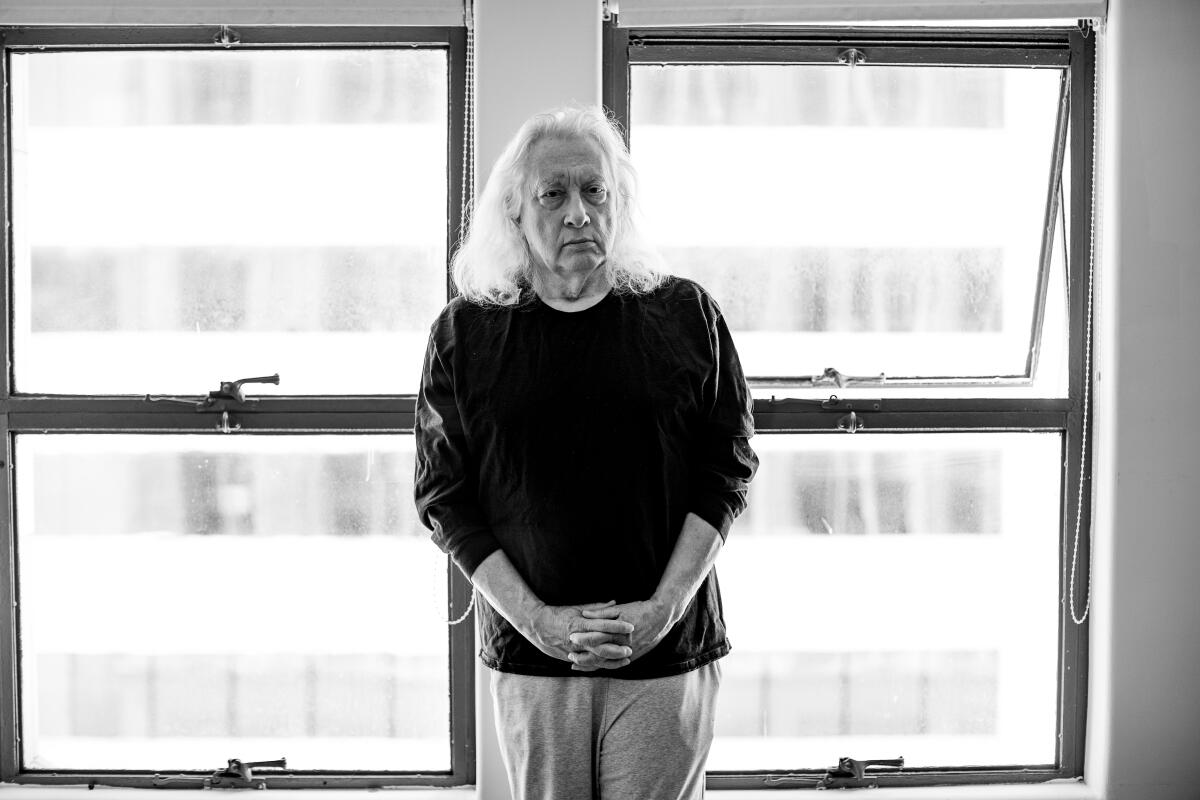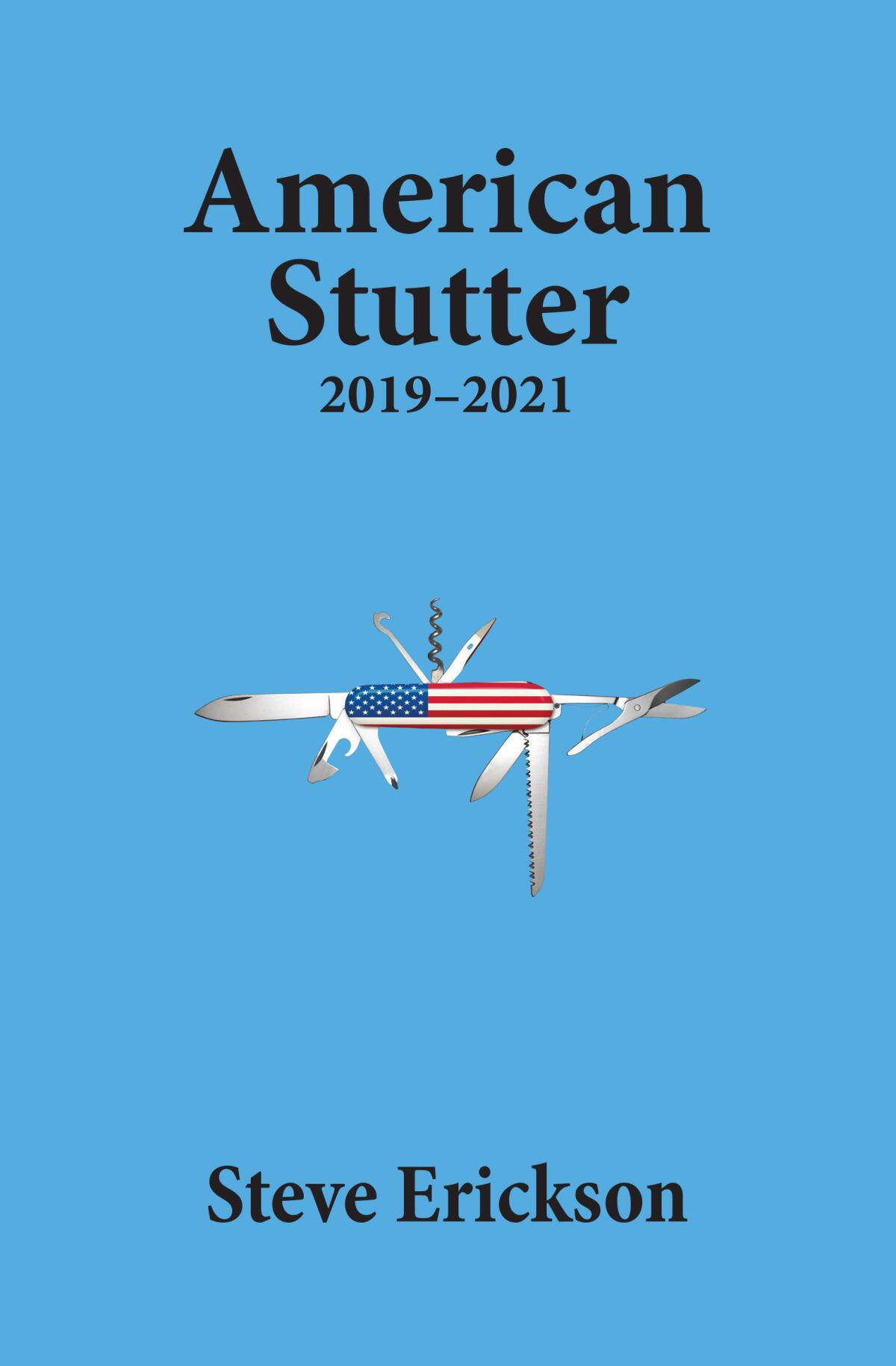Trump’s rise turned L.A. novelist Steve Erickson off fiction. So he wrote a primal diary

- Share via
On the Shelf
American Stutter: 2019-2021"
By Steve Erickson
Zerogram: 170 pages, $12
If you buy books linked on our site, The Times may earn a commission from Bookshop.org, whose fees support independent bookstores.
Steve Erickson’s “American Stutter: 2019-2021” is a howling yawp of a book, a diary that becomes a work of witness and of reckoning. “This is not a … memoir,” Erickson writes. “It’s not a novel, either. Everything that any reader believes to be fiction may be remembered. Everything that sounds remembered may be fiction.” Perhaps the best way to describe it is as a hallucinyx, which Erickson defines as “the literary equivalent of a hallucinogen,” before admitting — or does he? — that this is an invented word.
In many ways, the slipperiness tells us everything we need to know.
Erickson has long eclipsed boundaries; “Leap Year” (1989), his account of the 1988 presidential election, incorporates elements of the fantastic, while his recent novels “These Dreams of You” (2012) and “Shadowbahn” (2017) engage histories real and imagined and fictionalize the author’s family. The same characters — or their counterparts — appear in “American Stutter.”
In more basic terms, the book is an impassioned argument against the chaos of the Trump presidency and its hateful politics, the collapse of civility and common cause. For Erickson, such breakdowns coincide with creative challenges and the breakdown of his marriage, which he addresses through a searingly personal lens.
Erickson and I have been friends for more than 20 years, and we’ve spent a lot of time talking about literature and politics. So much of what he’s addressing in “American Stutter” feels so urgent — not least the dislocations of disunity. Recently, we sat down via Zoom to discuss the book, which originally appeared in the online magazine Journal of the Plague Years.
Over the last three months, 17 writers provided diaries to the Times of their days in isolation, followed by weeks of protest. This is their story.
“American Stutter” is framed as a diary but it’s also quasi-fictionalized. How did the book come about?
The book started as a journal, and everything in it happened, pretty much. It started as a journal because that was my way of processing the coming apart of certain aspects of my life that seemed to run parallel with the coming apart of the country. As a writer, this is how I make sense of things. But I had no sense when I started whether it would be a book.
The narrator says he no longer knows if he wants to write. Was that true of you?
Yes, I think it was. I certainly was not engaged by any fictional story. I felt like events had so outraced anything I could imagine. So the journal did kind of present itself to me in lieu of anything else I had to say.
The form is so immediate — it’s almost as if the standard structures were too rigid to contain the chaos of the moment.
I think you put your finger on it. The journal was the form that seemed to work right now. When I started I wasn’t necessarily thinking in those terms, but you know, if you’re writing anything for much time at all, some part of your brain starts thinking in practical terms about what you’re going to do with it. That’s what happened. But that’s not how it started. It started because I didn’t have another piece of work in mind that addressed what I was feeling. Anything else would have been a distraction, and I was not going to be distracted.
I’ve now gone — and I’ll admit this freely — six or seven years without a single idea for a novel. That could be because I’m burned out, but I think it is in large part because reality took over and there was nowhere I felt I could retreat.
It was seven years ago that Trump came down the escalator.
And it was that month, the month Trump announced his candidacy, that I finished the first draft of “Shadowbahn.” The timing is not a coincidence.

Trump plays a significant role in “American Stutter.” But one of the points you make is that he is not the problem but a symptom. The problem is us.
Trumpism has been around for decades, we just didn’t call it that. It goes back to Barry Goldwater, who would no longer be welcome in the Republican Party. When [Sen. Barry] Goldwater voted against the 1964 Civil Rights Act, the seed of Trumpism was planted. Before it was Trumpism, it was Palinism. And before it was Palinism, it was Gingrichism. Trump is just the ultimate and most grotesque expression of something that’s been going on for a while.
When did you decide the book would end with Biden’s inauguration? It makes for a guardedly hopeful ending, although I don’t feel as hopeful now.
The inauguration seemed the natural place to end, along with me finding a new place to live — that break in my own story. As I realized this was going to be a book, I had to balance the personal with the larger picture. January 2021 presented itself as an end point, maybe because I sensed this was as hopeful as things would get.
Annette Gordon-Reed, Ayad Akhtar, Héctor Tobar, Martha Minow, David Kaye and Jonathan Rauch discuss the Jan. 6 riot and what we do about it.
“America Stutter” begins in 2019, with Trump looking like a lock for reelection. Then COVID changes everything. Was that your experience?
I remember doing an event at the beginning of March 2020. COVID was out there, but it still felt a little distant. After that, it just descended. That’s what the journal was reflecting. I was caught up in the campaign, caught up in my own life, where my marriage was ending — and COVID was a parenthesis. It seemed to come around the corner very quickly.
What is it about America? Throughout the book, as in much of your work, you track the divide between the worst and better angels of our nature.
Very few countries I can think of started so purely as an idea. One we have clearly fallen short of, but we keep trying to get it right. I think it is as compelling an idea for a country as any other. But it is also clear that at least a third of the country has an idea that’s very different. So much gets down to race. That’s been the crucible from the outset. The inescapable reality is that sometime in the next quarter century, there’s going to be no more majority. For all of us who find that a thrilling fulfillment of pluralistic promise, there’s an America that’s just freaked out. So that’s the civil war now.
In the middle of “American Stutter” there’s a remarkable passage that begins in third person and ends in first. It’s like a three-dimensional metaphor for the dislocation at the center of the book.
It wasn’t an aesthetic decision. It was a part of the original journal. For me to step back and write about myself in third person was a classic case of the aesthetic growing out of the psychological. My reaction to all of this was visceral in a way it had never been before. I felt pretty visceral about the Iraq war. But this went to a whole other level.
To be honest, I think it was one reason New York publishers didn’t want the book. The word they used was “ferocity.” The ferocity is going to put off readers. But that was the whole idea.
T.C. Boyle, Viet Than Nguyen, Rachel Kushner, Carribean Fragoza, Tom Perrotta, Charles Yu, Michelle Tea, Dana Johnson, Luis J. Rodriguez on their pandemic years.
Ulin is the former book editor and book critic of The Times.
More to Read
Sign up for our Book Club newsletter
Get the latest news, events and more from the Los Angeles Times Book Club, and help us get L.A. reading and talking.
You may occasionally receive promotional content from the Los Angeles Times.









